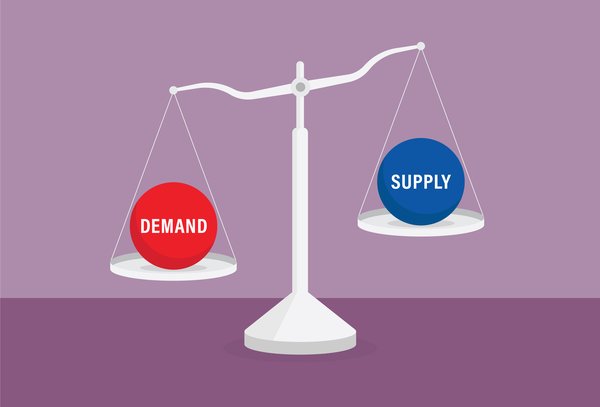Cryptocurrency has moved into the mainstream as an investment asset class. If you're looking to add some to your portfolio, it may be difficult to figure out how to get started. Crypto is currently unregulated, and investing in it can feel more Wild West than Wall Street.
Read on to learn the basics of cryptocurrency and how to get started investing in it.
What is cryptocurrency?
Cryptocurrency is a type of digital currency that doesn't rely on a central authority to verify transactions or create new units. Instead, it relies on cryptography to prevent counterfeiting.
Blockchain technology supports cryptocurrency. A blockchain consists of individual blocks of data that can contain information about anything, such as transactions made in a specific cryptocurrency. Each block of data makes a reference to the previous block, creating a chain of blocks. The reference uses cryptography to ensure the chain remains immutable so hackers are unable to change data.
There are thousands of cryptocurrencies in existence right now. That's largely due to the ease of creating a new currency by using smart contracts. New coins can simply piggyback on an existing blockchain that already has a well-established network of computers verifying blocks.
How to pick a cryptocurrency to invest in
Before you go ahead and buy some coins or tokens just because somebody says it's a good investment, it will pay to do some research.
First of all, it's important to understand that picking a good cryptocurrency is not like picking a good stock. A stock represents ownership in a company that creates profits for its shareholders, or at least has the potential to do so. Owning a cryptocurrency represents ownership in a digital asset with zero intrinsic value.
What makes a cryptocurrency increase or decrease in price is simple supply and demand. If there's increased demand and a limited supply increase, the price goes up. If supply becomes constrained, price goes up, and vice versa. So, when evaluating a cryptocurrency, the most important questions to answer are how the supply increases, and what will drive demand for the coin higher.
You can answer those questions by reading the white paper that a cryptocurrency team publishes to attract interest in their project. Look at the roadmap for a project and see if anything could spark an increase in demand. Research the team behind a project and see if they have the skills to execute their vision. Try to find a community of people already investing in the cryptocurrency and gauge their sentiment.
It's also important to consider how much money has already flowed into a cryptocurrency. If the market cap is already very high, there may not be much potential growth left. A high price will curb demand and increase supply as early investors look to take money off the table.

How to invest in cryptocurrencies
Once you've found a cryptocurrency you think will make a good investment, it's time to start buying.
The first step is to open an account with a cryptocurrency exchange. Most stock brokers don't support trading in cryptocurrency. Coinbase (COIN -3.24%) is one of the most popular and beginner-friendly exchanges in the U.S. Other options include Gemini, and newer brokers such as Robinhood (HOOD -2.63%) and SoFi (SOFI -0.28%) support crypto. Just be sure the exchange you want to use also supports the cryptocurrency you want to buy.
Once you've funded your account with fiat currency, you can make an order to buy your cryptocurrency. Orders on an exchange work the same way as orders in the stock market. The exchange will match your buy order with someone making a sell order at the same price and make the trade.
Once your trade is complete, the exchange will hold your cryptocurrency for you in a custodial wallet.
Buying cryptocurrency is the easy part. As a crypto investor, you have to be prepared for volatility. Crypto, in general, is more volatile than traditional asset classes such as stocks. Price swings of 10% or more in just a few hours are very common.
Additionally, you should consider how much of your portfolio you ultimately want to allocate to a specific cryptocurrency and to the asset class in general. With the volatility of crypto, be sure to give yourself wide bands of acceptable allocations. If your investments fall out of those bands, be sure to rebalance.
Advantages and drawbacks to investing in cryptocurrency
Investing in cryptocurrency has a few advantages:
- Diversification: The value of cryptocurrency doesn't appear to be correlated with the price of stocks, bonds, or other asset classes. That said, cryptocurrency has only existed for about a decade, so the data is limited in this regard. Theoretically, though, it makes sense that the price of crypto is unrelated to the price of traditional assets.
- Return potential: Cryptocurrency has produced extremely strong returns as adoption increases. Most people agree the expected return for a sound cryptocurrency investment is greater than that for stocks.
- Additional utility: Unlike stocks, some cryptocurrencies provide utility. Bitcoin (BTC 1.45%), for example, can be used to pay for goods and services. Other tokens may provide access to projects or discounts on a project's services.
But there are some big disadvantages for investors as well:
- Limited regulation: There's limited regulation in the cryptocurrency industry, which means you don't have the same protections as you do when investing in the heavily regulated stock market. If your account gets hacked, for example, you could find your investment completely gone without any recourse. If the coin you invest in turns out to be a scam, there's nothing you can do. Furthermore, increased regulation may decrease the demand for some cryptocurrencies, adding a risk to the investment.
- High volatility: The prices for cryptocurrency can swing wildly on a day-to-day basis. Such massive price swings can be hard for some investors to stomach.
Top cryptocurrencies to consider as a beginner investor
As a beginning cryptocurrency investor, you shouldn't try to find a diamond in the rough. You should get your feet wet with more established cryptocurrencies that have built-out networks to support them. That will allow you to get more familiar with the mechanics of cryptocurrency investing, as well as how it fits into your portfolio.
Bitcoin (BTC 1.45%) is an easy place to start. Every cryptocurrency exchange will support trading in Bitcoin. It's well-established, and you know what you're getting with Bitcoin. It's nothing fancy, just digital cash, but it has a first-mover advantage that had made it widely adopted. That gives Bitcoin a competitive advantage when it comes to being actually usable as a medium of exchange.
Ether (ETH 1.04%) is also a good choice for beginner investors. Ethereum's technology is behind most DeFi projects, which use the Ethereum blockchain to execute smart contracts and provide financial services without a central authority. Anytime a user wants to write a smart contract to the blockchain, they'll have to pay Ether to do so. Increased adoption of DeFi applications will lead to greater demand for Ether.
A third option for beginner investors is Cardano (ADA 3.24%). Cardano offers an alternative to Ethereum that's designed to be more energy efficient by using a proof-of-stake system to verify blocks on the blockchain. As such, it currently has much lower transaction fees than Ethereum. Additionally, Cardano has a hard cap on the total supply of the token similar to Bitcoin. That means the supply could become constrained in the future, which will drive the price higher.
Related Crypto Topics
Making money by investing in cryptocurrencies
Investing in crypto requires you to do your research and be confident enough in your investment to hang on during what's sure to be a wild ride. If you can do that, the payoff could be worth it as the expected returns are higher than most other asset classes.














































